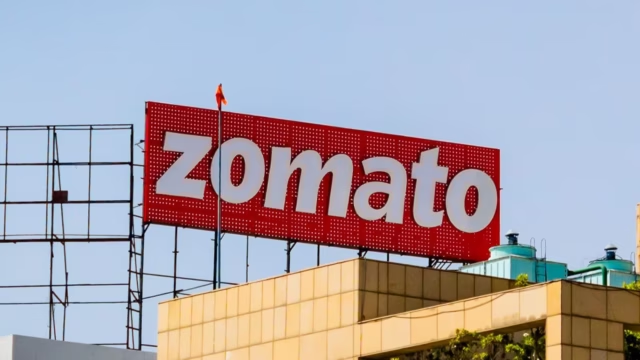
Shares of online food delivery giant Zomato took a significant hit today, plummeting by as much as 5% in morning trade. This sharp decline comes on the heels of a surprising move by Bank of America (BofA), which downgraded the stock from its previous rating to ‘neutral.’ Adding salt to the wound for investors, BofA also slashed its target price for Zomato’s shares to Rs 250, a considerable reduction from its earlier projection.
This sudden shift in sentiment from a major financial institution like BofA has sent ripples through the market, leaving many investors wondering about the future trajectory of the popular food delivery platform. What prompted this change of heart? What does this mean for existing and potential investors? And more importantly, is this a temporary blip or a sign of deeper underlying concerns?
According to sources familiar with BofA’s analysis, the downgrade primarily stems from concerns surrounding the company’s near-term growth prospects and the increasing competitive pressures within the online food delivery space. While Zomato has undoubtedly cemented its position as a market leader in India, analysts at BofA now believe that the company might face headwinds in sustaining its high growth rates in the coming quarters.
Several factors could be contributing to this cautious outlook. The resurgence of dine-in culture post-pandemic has presented a challenge to online food delivery platforms. As people feel more comfortable venturing out, the reliance on ordering food online might see a gradual moderation. Furthermore, the entry and expansion of new players in the already crowded food delivery market are intensifying competition, potentially squeezing profit margins and impacting Zomato’s market share.
Another aspect that might have influenced BofA’s decision is the performance of Zomato’s other ventures, particularly its quick commerce platform, Blinkit. While Blinkit holds immense potential, it operates in a highly competitive and capital-intensive segment. The path to profitability for quick commerce businesses remains uncertain, and any significant investments or losses in this vertical could weigh on Zomato’s overall financial performance.
The revised target price of Rs 250 by BofA suggests a more conservative valuation for Zomato. This new target implies a limited upside potential from the current trading price, signaling that the investment bank believes the stock’s growth might be capped in the near term. This assessment could prompt other institutional investors to re-evaluate their positions in Zomato, potentially leading to further selling pressure on the stock.
However, it’s crucial to remember that analyst ratings and target prices are not definitive predictions. They represent the opinion of a particular financial institution at a specific point in time, based on their analysis of available information. The actual performance of Zomato’s stock will depend on a multitude of factors, including the company’s execution of its strategies, evolving consumer behavior, and the overall macroeconomic environment.
Despite the negative trigger today, Zomato has demonstrated significant progress in recent years. The company has successfully expanded its reach, diversified its offerings, and shown a commitment to improving its financial metrics. Its focus on profitability, as evidenced in recent earnings reports, has been well-received by the market. The long-term growth story for online food delivery in India remains compelling, driven by increasing internet penetration, urbanization, and changing lifestyles.
For investors, this downgrade serves as a reminder of the inherent volatility and risks associated with investing in the stock market, especially in high-growth technology companies. It highlights the importance of conducting thorough research, understanding the underlying business fundamentals, and not solely relying on analyst ratings.
What should investors do now? For those already holding Zomato shares, it might be prudent to carefully assess their investment thesis and risk tolerance. Consider the reasons cited by BofA for the downgrade and evaluate if these concerns align with your own outlook for the company. It’s also wise to look beyond a single analyst rating and consider the broader consensus view from other financial experts.
Potential investors who were considering adding Zomato to their portfolio might view this dip as an opportunity to buy the stock at a lower price. However, it’s essential to conduct their own due diligence and understand the potential risks involved before making any investment decisions.
The coming quarters will be crucial for Zomato to demonstrate its resilience and ability to navigate the evolving market dynamics. Investors will be closely watching the company’s financial performance, particularly its revenue growth, profitability, and the progress of its various business segments. Any positive surprises or strategic initiatives that address the concerns raised by BofA could potentially lead to a reversal in the stock’s trajectory.
The downgrade by Bank of America has undoubtedly cast a shadow on Zomato’s near-term prospects, triggering a significant drop in its share price. While the concerns raised by the analysts regarding growth and competition warrant attention, it’s important to maintain a balanced perspective. Zomato remains a dominant player in a promising market, and its long-term success will ultimately depend on its ability to adapt, innovate, and execute its plans effectively. Investors should stay informed, conduct their own research, and make decisions based on their individual investment goals and risk appetite. This episode serves as a timely reminder that the stock market is a dynamic and often unpredictable arena, where fortunes can change swiftly based on evolving market sentiments and expert opinions.


















